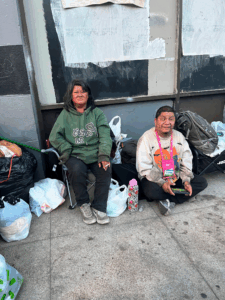
“The new poor farm is here. Utah’s governor Spencer Cox is only too happy to oblige, and the state has now proposed a detention campus for some 1,300 unhoused folks on the outskirts of Salt Lake City, miles from the nearest bus stop.”
It’s a bedrock principle, embedded in our consciousness and our culture, deeper than any law or legal decision. Back in the 1960’s, Justice William O. Douglas of the Supreme Court put it this way:
“Freedom of movement across frontiers in either direction, and inside frontiers as well, was a part of our heritage . . . . It may be as close to the heart of the individual as the choice of what he eats, or wears, or reads. Freedom of movement is basic in our scheme of values...”
As Justice Douglas observes, freedom involves independence, self-confidence, a sense of creativity. It is, in fact, essential to “the right of dissent…the right to be nonconformists and the right to defy submissiveness, [encouraging] lives of high spirits rather than hushed, suffocating silence.”
The Poor Farms
For centuries, profit-driven early capitalists built filthy, cold, crowded ramshackle dormitories for poor people where labor was compulsory. They were called “work houses” “poor houses” or “poor farms.” The economic revolutions of industrialization broke up peasant livelihoods, took the land, and drove masses of dispossessed people into industrial centers. They were not allowed to loiter. The ruling class of that day forced anyone who seemed “idle” or “vagrant” into these locked facilities. They forced them to work. “These facilities were designed to punish people for their poverty and, hypothetically, make being poor so horrible that people would continue to work at all costs.”
The class war of the Victorian age has continued into modern times. Until the 1940’s, Los Angeles maintained a vast poor farm where old and disabled workers were locked up, put to work, and punished with abuse.
Expulsion
Today’s powerful billionaire class is moving ever more rapidly toward imprisonment of the poor, initiating “a sweeping campaign to make homelessness itself a crime.” Today’s highly technological digital automated economy has displaced millions of working class people, disproportionately working class people of color. They cannot pay the rents that are increasingly demanded as the price of a home.
This poverty, a sign of vast and widening wealth inequality, results in expulsion of many workers from living space. Once evicted and expelled from housing, they break the law if they live outside on private, and even public, land.
According to one expert, this goes along with other forms of expulsion. Social scientist Saskia Sassen points out that “low-income workers and the unemployed [have been expelled] from government social welfare and health programs as well as from corporate insurance and unemployment support.” Sassen, “Expulsions: Brutality and Complexity In the Global Economy.”
The New Poor Farms
As president, Donald Trump now leads the billionaire class and represents its interests. In July, he issued Executive Order 14321, which focuses on involuntary forcible institutionalization in mental hospitals and more criminalization. The stated assessment is that homeless people are “primarily drug addicts and mentally ill.” Federal policy has now taken a giant step toward establishing new poor farms, busing unhoused people to camps far from cities.
Utah’s governor Spencer Cox is only too happy to oblige, and the state has now proposed a detention campus for some 1,300 unhoused folks on the outskirts of Salt Lake City, miles from the nearest bus stop. “Stern measures” will be used to arrest and sweep unhoused folks from the street. Then “beds” in the facility will be “offered” to unhoused folks as an alternative to jail. Nearly two thirds will be placed there involuntarily for “psychiatric” or “substance abuse” “treatment.” The remainder will be required to live in “work-conditioned housing” where forced labor is envisioned as a means for “rehabilitation” and “moral development.” It will cost untold millions. Its promoters are in a position to profit.
“Freedom Is A Constant Struggle” (Name of a KPFA Radio Program in the Seventies)
Utah’s plans follow a high-cost push to incarcerate working class people who have lost their housing across the country. For example, in California homeless-related arrests have soared now that the Supreme Court, in the Martin v. Boise case, has lifted any restrictions on the police.
Here in California, “Care Court” laws invented a scheme for court-enforced involuntary treatment of schizophrenia, advocated by Governor Newsom as a means of removing mentally disabled people who are unhoused from the street. A handful of potential cases – only 42 in San Francisco – have cost tens of millions for new courts. No new services or housing have been created.
Last year, Proposition 36, which was titled the “Homelessness, Theft Reduction, and Drug Addiction Act” created a new category of crimes – “treatment felonies.” The claim on the ballot was that certain offenders charged with drug offenses and other minor crimes like petty theft could opt for “treatment” instead of jail or prison. Tens of thousands of people have been prosecuted and sent to jail under Prop 36 in counties across the state.
According to one jail reform expert, Claire Simonich from the Vera Project, “It promised mass treatment, but, instead, the increased incarceration rates are siphoning local funding” from programs that help people and help keep them out of jail.
Justice William O. Douglas long ago pointed out that freedom, and especially freedom of movement, is fundamental to our society. Without it, as he said, we are doomed to lives of “hushed, suffocating silence.” Jessica, who lives outside in Sacramento, is a vendor for this newspaper, The San Francisco Street Sheet. “I cannot live without freedom,” she says. “And I will not live without freedom. I will stand my ground.”
This article will also appear in the Street Sheet, which is sold by homeless vendors in San Francisco and Sacramento.
Editor’s Note. This article was corrected on January 15 to more accurately reflect Executive Order 14321.

